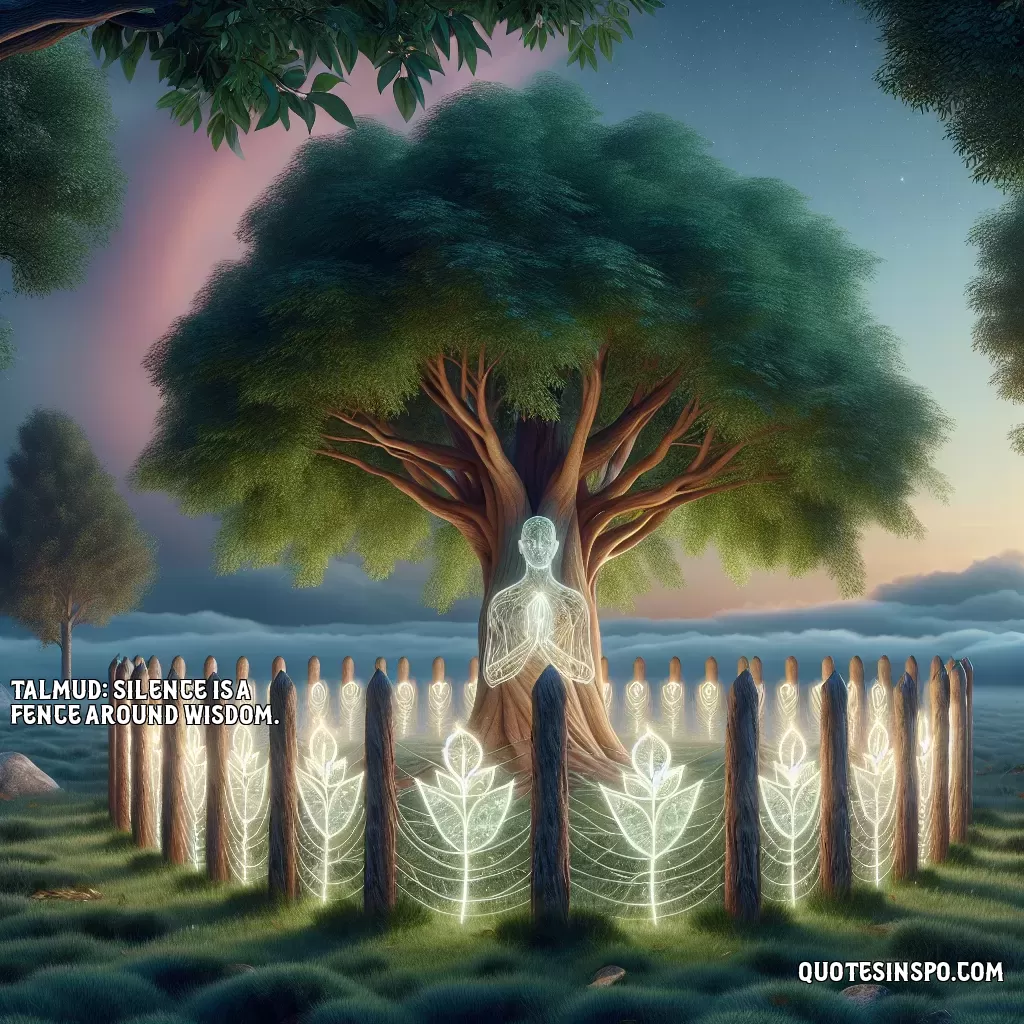
Talmud: Silence is a fence around wisdom.
The quote "Silence is a fence around wisdom," attributed to the Talmud, conveys a profound understanding of the role silence plays in the cultivation and preservation of wisdom. This metaphor suggests that silence acts as a protective barrier that both guards and nurtures wisdom. In this context, wisdom is the deep understanding of life, often cultivated through experience, observation, and reflection. It is not merely knowledge, which is the accumulation of facts, but an ability to discern the most appropriate and meaningful actions or thoughts. The "fence" metaphor implies that wisdom is something precious that requires safeguarding, and silence serves this purpose effectively. Silence allows individuals the space to contemplate, reflect, and process experiences without the distraction of constant communication. By remaining silent, one can observe and learn from the world around them, which leads to the development of nuanced insights and deeper understanding. Moreover, silence provides the opportunity to listen to others, which is essential for gaining diverse perspectives and broadening one's wisdom. Furthermore, silence in conversation can be a sign of humility and restraint. It conveys that one does not always have to speak to show knowledge but can demonstrate wisdom by choosing when to speak and when to remain quiet. This ability to listen rather than immediately respond encourages thoughtful and measured discourse, enhancing human interaction and understanding. In essence, the Talmud suggests that wisdom is safeguarded and enriched by silence, which provides the necessary space for introspection and learning, ensuring that wisdom is not diluted by impulsive words or thoughts. By surrounding wisdom with the "fence" of silence, it is allowed to mature and become more profound.
Quote By: Ben Zoma
**Ben Zoma: A Pillar of Talmudic Wisdom**
Ben Zoma, a distinguished Tanna of the early rabbinic period, is a central figure in Jewish scholarship, particularly revered for his profound insights and interpretations found in the Mishnah and Talmud. Active during the late 1st and early 2nd centuries CE, Ben Zoma was a contemporary of prominent sages such as Rabbi Akiva and Rabbi Meir, and his contributions to Jewish thought have left an indelible mark on the landscape of rabbinic literature.
Born into a well-regarded family, Ben Zoma's intellectual pursuits began at a young age. He became a student of Rabbi Joshua, who was known for his wisdom and commitment to Torah study. Under the tutelage of Rabbi Joshua and other revered sages, Ben Zoma honed his skills in exegesis and halachic analysis, quickly distinguishing himself as a leading authority in Jewish law and ethics.
Ben Zoma is perhaps best known for his famous aphorisms, which are featured prominently in the Pirkei Avot, a collection of ethical teachings from the Tannaim. His sayings often emphasize the importance of knowledge, humility, and the pursuit of wisdom. One of his most notable maxims states, "Who is wise? One who learns from every person." This encapsulates his belief in the value of lifelong learning and the humility required to grow intellectually.
In addition to his ethical teachings, Ben Zoma is recognized for his inquisitive nature, which led him to explore profound philosophical questions about existence and the universe. His unique perspective on the relationship between God and humanity contributes to discussions in Jewish mysticism and philosophical thought.
Ben Zoma's legacy continues to influence Jewish education and debate, with his teachings being studied and referenced in yeshivas around the world. His ability to integrate rigorous scholarship with spiritual insights ensures that he remains a pivotal figure in Jewish history. As a proponent of wisdom and understanding, Ben Zoma's life stands as a testament to the enduring value of knowledge, humility, and the pursuit of truth in Jewish tradition.